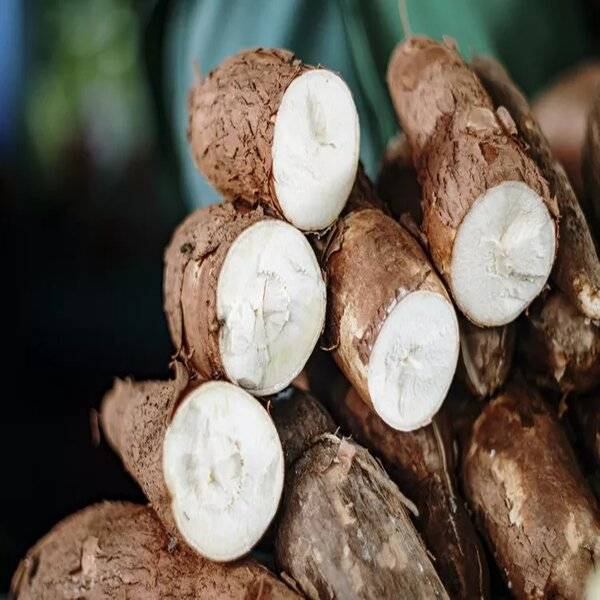Cassava, also known as yuca, is a root vegetable native to South America and a dietary staple for millions in Africa, Asia, and Latin America. Often compared to potatoes for their starchy goodness, cassava offers a unique blend of nutrients and potential health benefits. Let's delve into the world of cassava and explore what makes this root vegetable a valuable addition to your diet.
A Nutritional Powerhouse:
One of the biggest advantages of cassava is its impressive nutritional profile. A single cup of cooked cassava boasts a good chunk of your daily recommended intake of carbohydrates, providing a readily available source of energy. But cassava goes beyond just carbs. It's a good source of dietary fiber, which promotes gut health and digestion.
Cassava shines in the vitamin and mineral department as well. It's a rich source of vitamin C, a powerful antioxidant that strengthens the immune system and fights free radical damage. Folate, another key nutrient abundant in cassava, is essential for healthy cell growth and development, particularly during pregnancy. Additionally, cassava provides potassium, a mineral that helps regulate blood pressure and maintains proper fluid balance in the body.
Digestive Health Benefits:
Cassava contains a special type of fiber called resistant starch. Unlike regular fiber, resistant starch isn't fully broken down in the small intestine. Instead, it reaches the large intestine where it feeds beneficial gut bacteria. This promotes a healthy gut microbiome, which can improve digestion, reduce inflammation, and even boost the immune system.
Potential Blood Sugar Management:
Cassava's resistant starch content might also play a role in blood sugar management. Resistant starch behaves similarly to dietary fiber, slowing down the absorption of glucose into the bloodstream. This can be beneficial for individuals with prediabetes or type 2 diabetes, as it helps maintain healthy blood sugar levels. However, more research is needed to fully understand the impact of cassava consumption on blood sugar control.
Energy Source and Gluten-Free Option:
Cassava, being rich in carbohydrates, provides a sustained source of energy. This makes it a perfect food for athletes or individuals with active lifestyles. Moreover, tapioca, a starch extracted from cassava, serves as a well-liked gluten-free substitute for wheat flour. This makes cassava a valuable dietary option for people with celiac disease or gluten sensitivity.
Precautions and Preparation Tips:
It's important to note that cassava in its raw form contains linamarin, a compound that can release cyanide when consumed. However, proper preparation methods like peeling, soaking, fermenting, or boiling effectively remove linamarin, making cassava safe for consumption. It's crucial to choose cassava processed correctly to avoid any potential health risks.
Culinary Delights with Cassava:
Cassava is a versatile ingredient that can be enjoyed in various ways. Boiled or roasted cassava has a mild, nutty flavor and can be mashed, made into fries, or used in soups and stews. Tapioca flour, derived from cassava, is commonly used in puddings, thickening sauces, and baking gluten-free breads and pastries. In some regions, fermented cassava leaves are also consumed as a nutritious green vegetable.
Conclusion:
Cassava is a starchy root vegetable with a surprising array of health benefits. It's a rich source of essential nutrients, promotes gut health, and might even contribute to blood sugar management. With proper preparation methods, cassava can be a delicious and nutritious addition to your diet. So, next time you're looking for a new source of energy or a gluten-free option, consider exploring the world of cassava!




No comments yet
Be the first to share your thoughts!